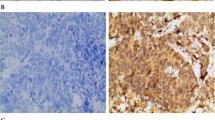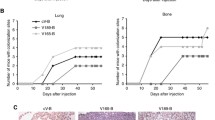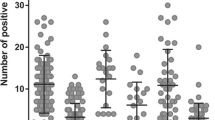Abstract
Vascular endothelial growth inhibitor (VEGI) is a novel anti-angiogenic cytokine that belongs to the tumour necrosis factor (TNF) superfamily. Very little is known about the significance of VEGI in cancer. Our study analysed VEGI expression in relation to breast cancer patient clinical parameters. The VEGI expression profile was assessed qualitatively (RT-PCR), quantitatively (real-time Quantitative-PCR), and immuno-histochemically (IHC), in a panel of 24 human normal and cancer cell lines and in a cohort of 151 mammary tissue samples (n = 33 normal breast tissue; n = 118 breast cancer tissue) with a 6-year median follow-up. Patients who had died of breast cancer or had local recurrence of the disease expressed significantly lower levels of VEGI in comparison to the elevated levels in the disease free patients. High levels of VEGI were associated with an increased chance of patient survival. Importantly, patients with breast tumours expressing reduced levels of VEGI had a poorer prognosis than those patients expressing high levels of VEGI. However, no significant correlations were observed between VEGI expression and tumour grade, TNM classification, or nodal involvement. In conclusion, VEGI is aberrantly expressed in human breast cancer tissues. VEGI displays prognostic relevance as breast cancer patients with an overall poor prognosis express significantly lower levels of VEGI compared to those with a favourable prognosis.
Similar content being viewed by others
References
Althuis MD, Dozier JM, Anderson WF et al (2005) Global trends in breast cancer incidence and mortality 1973–1997. Int J Epidemiol 34:405–412
Boyle P, Ferlay J (2005) Cancer incidence and mortality in Europe, 2004. Ann Oncol 16:481–488
Folkman J (1990) What is the evidence that tumors are angiogenesis dependent? J Natl Cancer Inst 82:4–6
Blood CH, Zetter BR (1990) Tumour interactions with the vasculature: angiogenesis and tumour metastasis. Biochim Biophys Acta 1032:89–118
Guidi AJ, Berry DA, Broadwater G et al (2000) Association of angiogenesis in lymph node metastases with outcome of breast cancer. J Natl Cancer Inst 92:486–492
Li J, Song ST, Jiang ZF et al (2003) Significance of microvascular density and vascular endothelial growth factor in breast cancer. Zhonghua Zhong Liu Za Zhi 25:145–148
Gasparini G (1996) Clinical significance of the determination of angiogenesis in human breast cancer: update of the biological background and overview of the Vincenza studies. Eur J Cancer 32:2485–2493
Weidner N, Folkman J, Pozza F et al (1992) Tumour angiogenesis: a new significant and independent prognostic indicator in early stage breast carcinoma. J Natl Cancer Inst 84:1875–1887
Bosari S, Lee AK, DeLellis RA et al (1992) Microvessel quantitation and prognosis in invasive breast carcinoma. Hum Pathol 23:755–761
Toi M, Kashitani J, Tominaga T (1991) Tumour angiogenesis is an independent prognostic indicator in primary breast carcinoma. N Engl J Med 324:1–8
Horak ER, Leek R, Klenk N et al (1992) Angiogenesis, assessed by platelet/endothelial cell adhesion molecule antibodies, as indicator of node metastases and survival in breast cancer. Lancet 340:1120–1124
Tsutsui S, Kume M, Era S (2003) Prognostic value of microvessel density in invasive ductal carcinoma of the breast. Breast Cancer 10:312–319
Toi M, Inada K, Suzuki H et al (1995) Tumour angiogenesis in breast cancer: its importance as a prognostic indicator and the association with vascular endothelial growth factor expression. Breast Cancer Res Treat 36:193–204
Hanahan D, Folkman J (1996) Patterns and emerging mechanisms of the angiogenic switch during tumorigenesis. Cell 86:353–364
Ferrara N (2002) VEGF and the quest for tumour angiogenesis factors. Nat Rev Cancer 2:795–803
Dvorak HF (2002) Vascular permeability factor/vascular endothelial growth factor: a critical cytokine in tumour angiogenesis and a potential target for diagnosis and therapy. J Clin Oncol 20:4368–4380
Maeda K, Chung YS, Ogawa Y et al (1996) Prognostic value of vascular endothelial growth factor expression in gastric carcinoma. Cancer 77:858–863
Zhang HT, Craft P, Scott PA et al (1995) Enhancement of tumour growth and vascular density by transfection of vascular endothelial cell growth factor into MCF-7 human breast carcinoma cell. J Natl Cancer Inst 87:213–219
Linderholm B, Tavelin B, Grankvist K et al (1998) Vascular endothelial growth factor is of high prognostic value in node negative breast carcinoma. J Clin Oncol 16:3121–3128
Gasparani G, Toi M, Gion M (1997) Prognostic significance of vascular endothelial growth factor protein in node-negative breast carcinoma. J Natl Cancer Inst 89:139–147
Zhai Y, Yu J, Iruela-Arispe L et al (1999) Inhibition of angiogenesis and breast cancer xenograft tumour growth by VEGI, a novel cytokine of the TNF superfamily. Int J Cancer 82:131–136
Shakibaei M, Schulze-Tanzil G, Takada Y et al (2005) Redox regulation of apoptosis by members of the TNF superfamily. Antioxid Redox Signal 7:482–496
Havell EA, Fiers W, North RJ (1990) The anti-tumour function of tumour necrosis factor (TNF). J Exp Med 167:1067–1085
Asher AL, Mule JJ, Reichert CM et al (1987) Studies on the anti-tumour efficacy of systemically administered recombinant tumour necrosis factor against several murine tumors in vivo. J Immunol 138:963–974
Zhai Y, Ni J, Jiang G et al (1999) VEGI, a novel cytokine of the tumour necrosis factor family, is an angiogenesis inhibitor that suppresses the growth of colon carcinomas in vivo. FASEB J 13:181–189
Migone TS, Zhang J, Luo X et al (2002) TL1A is a TNF-like ligand for DR3 and TR6/DcR3 and functions as a T cell costimulator. Immunity 16:479–492
Yang CR, Hsieh SL, Teng CM et al (2004) Soluble decoy receptor 3 induces angiogenesis by neutralization of TL1A, a cytokine belonging to tumour necrosis factor superfamily and exhibiting angiostatic action. Cancer Res 64:1122–1129
Parr C, Watkins G, Mansel RE et al (2004) The hepatocyte growth factor regulatory factors and human breast cancer. Clin Cancer Res 10:202–211
Jiang WG, Douglas-Jones A, Mansel RE (2003) Level of expression of PPAR-gamma and its co-activator (PPAR-GCA) in human breast cancer. Int J Cancer 106:752–757
Parr C, Jiang WG (2001) Expression of hepatocyte growth factor/scatter factor, its activator, inhibitors and the c-Met receptor in human cancer cells. Int J Oncol 19:857–863
Folkman J (1995) Angiogenesis in cancer, vascular, rheumatoid and other disease. Nat Med 1:27–31
Peter C, Rakesh KJ (2000) Angiogenesis in cancer and other diseases. Nature 407:249–257
Uzzan B, Nicolas P, Cucherat M et al (2004) Microvessel density as a prognostic factor in women with breast cancer: a systematic review of the literature and meta-analysis. Cancer Res 64:2941–2955
Carmeliet P (2000) Mechanisms of angiogenesis and arteriogenesis. Nat Med 6:389–395
Yu J, Tian S, Metheny-Barlow L et al (2001) Modulation of endothelial cell growth arrest and apoptosis by vascular endothelial growth inhibitor. Circ Res 89:1161–1167
Hou W, Medynski D, Wu S et al (2005) VEGI-192, a new isoform of TNFSF15, specifically eliminates tumour vascular endothelial cells and suppresses tumour growth. Clin Cancer Res 11:5595–5602
Chew LJ, Pan H, Yu J et al (2002) A novel secreted splice variant of vascular endothelial cell growth inhibitor. FASEB J 16:742–744
Lehmann W, Edgar CM, Wang K et al (2005) Tumour necrosis factor alpha (TNF-alpha) coordinately regulates the expression of specific matrix metalloproteinases (MMPS) and angiogenic factors during fracture healing. Bone 36:300–310
Xiao Q, Hsu CY, Chen H et al (2005) Characterization of cis-regulatory elements of the vascular endothelial growth inhibitor gene promoter. Biochem J 388:913–920
Acknowledgements
The authors wish to thank the Breast Cancer Campaign and Cancer Research Wales (CRW) for supporting this work.
Author information
Authors and Affiliations
Corresponding author
Rights and permissions
About this article
Cite this article
Parr, C., Gan, C.H., Watkins, G. et al. Reduced vascular endothelial growth inhibitor (VEGI) expression is associated with poor prognosis in breast cancer patients. Angiogenesis 9, 73–81 (2006). https://doi.org/10.1007/s10456-006-9033-1
Received:
Accepted:
Published:
Issue Date:
DOI: https://doi.org/10.1007/s10456-006-9033-1




